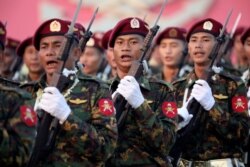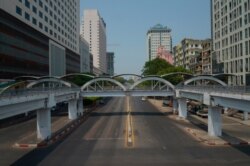Myanmar’s military continues its violent pushback against anti-coup protests, more than seven weeks after it forcibly took control of the country.
Since the coup on February 1, thousands of pro-democracy protesters have demanded the return to power of the democratically elected government.
In the military’s efforts to subdue demonstrators, thousands have been detained and hundreds have been killed, according to the non-profit Assistance Association for Political Prisoners Burma (AAPPB). The group is based in Thailand and says it is founded by former political prisoners living in exile on the border between the two countries.
And Myanmar’s annual Armed Forces Day is fast approaching with the violent unrest continuing unabated.
What is Armed Forces Day?
On March 27, Myanmar’s Armed Forces Day commemorates the army’s rebellion against Japanese occupation in 1945. The annual event is a public holiday that typically features a large-scale military parade in the capital city, Naypyitaw.
But this year is expected to be different.
Because of the coronavirus pandemic, last year’s 75th anniversary event was postponed. This year's celebrations are proposed to go proceed but could be reduced because of the ongoing pandemic and anti-coup protests.
Burmese political analyst Aung Thu Nyein told VOA in February the military could use the day as a reason to celebrate its “victory.”
“Regularly, the military celebrates its Armed Forces Day on March 27 with a parade and honoring its achievement. For this reason, as the military is in power, they will use the event as a victory,” he said.
According to one Myanmar activist, demonstrators are approaching the day with caution. Calls for nationwide protests have not been widely announced because of the increasingly violent risks posed by the military crackdown.
Moe Thway, founder of Myanmar’s Generation Wave, says the “price is so high” for anti-coup protesters.
“They are using a very brutal way to crack down on protests, only protests; they are shooting without any reason. To call mass protests is very risky, no one wants to do that to risk the life of the people,” he told VOA.
The activist acknowledges, though, that because the pro-democracy resistance is leaderless, it appears likely protests will occur.
“Nobody can stop the people protesting. In the whole movement, there is no particular leading group or [a] particular leader,” he added.
Evidence of changing tactics among anti-coup demonstrators was apparent Wednesday as the country saw a nationwide “silent strike.” Images circulated online of deserted streets and empty roads. Witnesses said shops and businesses were closed with people not turning up for work on Wednesday in Yangon, according to a Reuters report.
But amid the change of approach, one Myanmar security analyst, who chose to remain anonymous, told VOA that Armed Forces Day will still see “wider protests,” which could turn ugly.
“The police brutality over the past four weeks has radicalized the younger generation and we are going to see not just peaceful protests, but hit-and-run sort of attacks on police outposts and family residences,” the security analyst said.
Background
Myanmar, formerly known as Burma, was under military rule from 1962 until 2011. In 2015, Aung San Suu Kyi led her National League for Democracy (NLD) party to victory in the country’s first open democratic election.
The NLD gained another win in November’s general elections, but the military-backed opposition contested the results, claiming widespread fraud, without offering any proof. On February 1, the Myanmar military, also known as the Tatmadaw, removed the NLD government and detained Suu Kyi and President Win Myint.
Protesters have demanded the military release its leaders, with widespread protests nationwide. But the army has responded by using armored vehicles and opening fire, while imposing martial law and implementing daily internet shutdowns across the country.
Despite scant communication about the military event, the junta—officially the State Administrative Council (SAC)—already has suggested the day will hold some form of celebrations. Invitations already have been sent to some of Myanmar’s armed ethnic organizations (EAOs), though several already have snubbed the invites, The Irrawaddy reports.
The Karen National Union (KNU), a separatist political organization claiming to represent the ethnic Karen people of Myanmar, tweeted, “The KNU will only attend ceremonies that reflect dignity, humanity, justice and freedom for all.”
Khin Ma Ma Myo, a Burmese military analyst and author, told VOA the military will seek to use the parade as a show of strength.
“The military used to do testing-the-ground method for crowd control and dispersal in previous uprisings, and time-buying strategy to make people feeling exhausted before starting their operations. The military will motivate their soldiers by setting Tatmadaw day as the victory day in March.”
The analyst noted the military’s strategy to discourage dissidents will be the use of long-term jail sentences.
“In my opinion, politicians including Daw Aung San Suu Kyi will face long-term prison sentences,” she added.
Suu Kyi is facing at least four charges from the junta government that include possessing unlicensed walkie-talkies and incitement to cause public unrest.
The NLD leader was scheduled to be in court Wednesday but the hearing was adjourned until April 1 after internet connectivity issues prevented videoconferencing for the proceedings.
Suu Kyi’s lawyer, Khin Maung Zaw, confirmed to VOA he has been unable to meet with his client, and said he was blocked from going to the courthouse. Suu Kyi has been in detention since February 1, and she currently is being held in an undisclosed residence in Naypyitaw.






